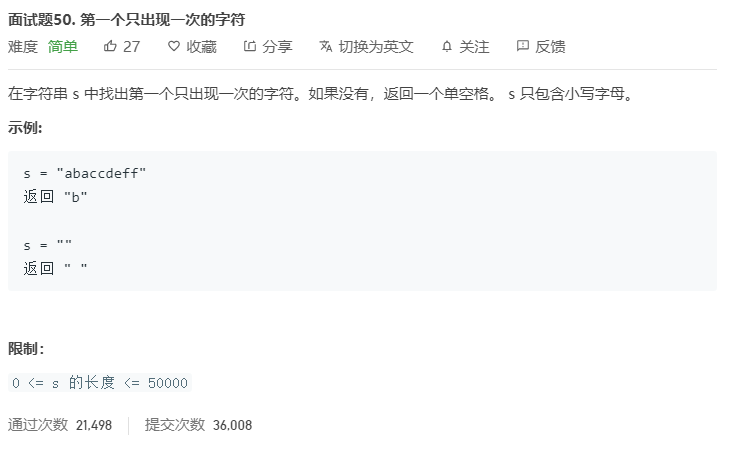[Lc]面试题50第一个只出现一次的字符
Contents
题目

题解
三个方法,前两个都是基于哈希表,只是哈希表的实现方式不同;最后一个是对于数据流的处理情况,这个情况只能遍历字符串一遍,因此需要再遍历新定义的哈希表(即vector)一遍。
- 时间复杂度$O(n)$
- 空间复杂度$O(n)$
1. 哈希表
class Solution {
public:
char firstUniqChar(string s) {//三个方法。1.哈希表
unordered_map<char, int> m;//定义哈希表
for(auto &c : s) m[c]++;//第一次遍历,确定每个字符的出现次数
for(auto &c : s){
if(m[c]==1) return c;//第二次遍历,碰到个数为1的直接返回
}
return ' ';//其他情况直接返回空字符
}
};
2. 自制哈希表
class Solution {//三个方法。2.自制哈希表
public:
char firstUniqChar(string s) {
vector<int> m(128,0);//定义自制哈希表,用vector实现
for(auto &c : s) m[c]++;//第一次遍历,确定每个字符的出现次数
for(auto &c : s){
if(m[c]==1) return c;//第二次遍历,碰到个数为1的直接返回
}
return ' ';//其他情况直接返回空字符
}
};
3. 数据流处理
class Solution {//三个方法。3.数据流处理
public:
char firstUniqChar(string s) {
vector<int> m(128,-1);//定义自制哈希表,用vector实现
//只遍历一遍s
for(int i=0; i<s.size(); ++i){
//若个数超过1个,标记为-2
//若个数等于1个,标记为出现的位置
//其他的都为-1
if(m[s[i]]==-2) continue;//
else if(m[s[i]]>=0) m[s[i]]=-2;
else m[s[i]] = i;
}
//再遍历vector,取出其中不为负且值最小的字符下标
int res = INT_MAX;
for(auto &t : m){
if(t>=0) res = min(res, t);
}
//若该下标为INT_MAX说明没有只出现一次的字符,返回空字符
return res==INT_MAX? ' ':s[res];
}
};
Author ChrisHRZ
LastMod 2020-06-12